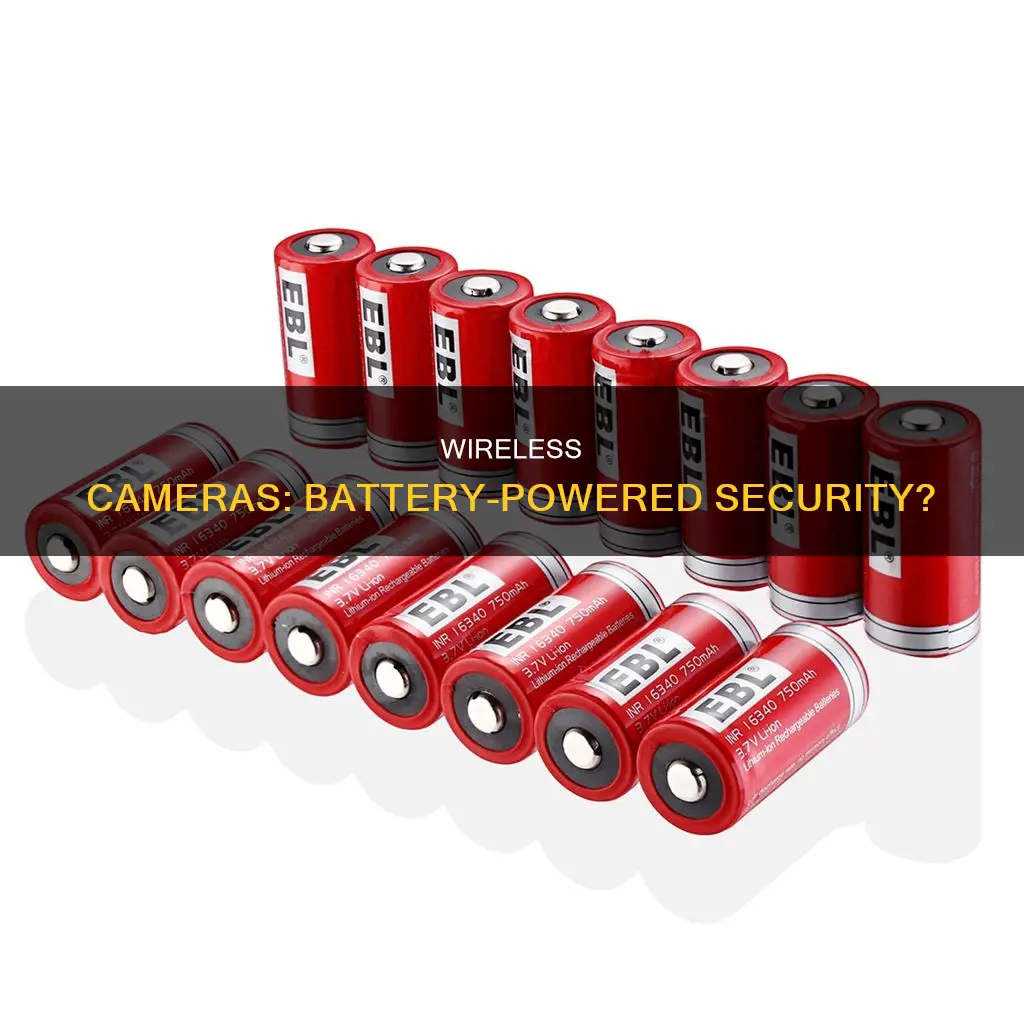
Wireless security cameras are a popular choice for home security due to their ease of installation and convenience. However, one of the biggest concerns with these cameras is their battery life and whether they can run without a direct power source. While some wireless security cameras are hard-wired to a power source, there are a few models on the market that use batteries, allowing for completely wireless operation. These wireless security cameras usually run on rechargeable batteries, which need to be replaced or recharged periodically, depending on usage and other factors.
| Characteristics | Values |
|---|---|
| How often do wireless security cameras need to be charged? | Between every 1 and 6 months, depending on usage, battery capacity, settings, temperature, firmware, and other factors. |
| How long does it take to charge wireless security cameras? | Between 2 and 10 hours. |
| Do wireless cameras need to be plugged in? | Wireless cameras may or may not need to be plugged in. 'Wireless' refers to their method of transferring data, not how they are powered. |
| How long do batteries in wireless security cameras last? | Per charge, batteries last up to 6 months in low-traffic areas and 2-3 months in medium to high-traffic areas. |
| What is the overall lifespan of batteries in wireless security cameras? | At least 5 years. |
| What factors contribute to batteries running out quickly? | Low battery capacity, continuous video recording, cold weather, weak and unstable internet connection, night vision technology, outdated firmware, high-traffic areas, and low-light conditions. |
| How can you improve battery life? | Ensure optimal camera location, turn on energy-saving features, use a solar panel, and have a backup battery. |
What You'll Learn
- Wireless security cameras may or may not be battery-powered
- Wireless security cameras need to be charged between every 1 and 6 months
- Wireless security cameras take between 2 and 10 hours to charge
- Wireless security camera batteries last up to 6 months per charge
- Wireless security cameras can work without electricity

Wireless security cameras may or may not be battery-powered
Wireless security cameras that are battery-powered tend to use rechargeable batteries. The most common types of rechargeable batteries are nickel-metal hydride and lithium-ion. These two types of batteries have different pros and cons and should be considered separately.
Nickel-metal hydride batteries have a higher energy density and are more compatible, with a greater variety of sizes available. They are also safer due to the lower amount of active materials. However, they are sensitive to extreme temperatures and require a longer charging time.
Lithium-ion batteries, on the other hand, require less time to recharge and have a higher tolerance for high temperatures. They can store more energy per gram of battery. However, they have a lower internal capacity and more limited compatibility than nickel-metal hydride batteries.
The battery life of wireless security cameras varies depending on factors such as usage, battery capacity, settings, temperature, and firmware. On average, a wireless security camera will last between one and six months on a single charge. Cameras with motion detectors will preserve battery life, while continuous recording will drain the battery more quickly. Other features such as night vision and outdated firmware can also contribute to faster battery drainage.
To improve battery life, it is recommended to ensure optimal camera placement, make use of energy-saving features, and consider alternative power sources such as solar panels.
Rapid Charging: Powering Your Camera in a Flash
You may want to see also

Wireless security cameras need to be charged between every 1 and 6 months
Wireless security cameras are a convenient way to keep your home or property safe. They are often preferred to wired cameras due to their ease of use, cloud storage capabilities, and push notifications. However, one potential drawback is the need to manually change or charge their batteries periodically.
The battery capacity of different wireless camera models can vary significantly. Some camera systems with low-capacity batteries might only run for a few weeks before needing a recharge. On the other hand, some cameras with higher-capacity batteries can last for several months between charges.
It's important to note that "wireless" refers to the camera's method of transferring data through the internet, not how it is powered. Some wireless cameras, like the AlfredCam, are plug-in and don't require charging, while others, like the Google Nest Cam, are wire-free and rely on periodic charging or battery replacement.
The good news is that per charge, batteries in wireless security cameras can last up to 6 months in low-traffic areas. However, in high-traffic areas or with continuous recording, the battery may only last 2 to 3 months. The overall lifespan of these batteries is at least five years, and they can be recharged hundreds of times, depending on the battery type.
To improve the battery life of your wireless security camera, consider the following:
- Ensure optimal camera placement: Avoid high-traffic areas and reduce unnecessary motion detection triggers.
- Enable energy-saving features: Adjust motion detection sensitivity, enable 'people-only' detection, or set up predefined zones.
- Explore solar power: Solar panels can provide a cost-effective and continuous power source for your camera.
- Utilize a backup battery: This ensures uninterrupted camera operation while the primary battery is being recharged.
BestBuy's Camera Restocking Fee: Why the Extra Charge?
You may want to see also

Wireless security cameras take between 2 and 10 hours to charge
Wireless security cameras are a popular choice due to their ease of use and convenient features like cloud storage and push notifications. However, one of the drawbacks is the need to periodically recharge their batteries. The time it takes to charge these batteries varies, with some wireless security cameras taking as little as 2 hours to fully charge, while others may take up to 10 hours.
The charging time for wireless security cameras is influenced by several factors. Cameras that require frequent charging tend to charge faster, often taking only a few hours. On the other hand, cameras that can go several months between charges usually take much longer to recharge, especially when they are new.
The battery life of wireless security cameras is affected by various factors, including camera usage, battery capacity, security camera settings, temperature, firmware, and more. For example, cameras in high-traffic areas or those with continuous video recording enabled will drain their batteries much faster. Additionally, cold temperatures can significantly impact battery performance, with temperatures below minus-4 degrees Fahrenheit reducing battery performance by up to 50%.
To maximise the battery life of your wireless security camera, consider the following tips:
- Ensure optimal placement of the camera to avoid unnecessary motion detection triggers.
- Utilise the camera's energy-saving features, such as reducing motion detection sensitivity or enabling "people-only" detection.
- Explore alternative power sources, such as solar panels, to provide a constant power supply and reduce the need for frequent recharging.
- Invest in a backup battery to ensure uninterrupted camera operation while the primary battery is being recharged.
By following these tips and staying mindful of the factors that impact battery life, you can improve the efficiency of your wireless security camera system and reduce the time spent on charging batteries.
Charging Camera Batteries: Portable Power Options
You may want to see also

Wireless security camera batteries last up to 6 months per charge
Wireless security cameras are a convenient option for monitoring your home or property, especially in rural or off-grid areas without a direct power source. While not all wireless security cameras run on batteries, those that do can last for up to 6 months per charge.
The length of time a battery charge lasts depends on several factors, including the type of battery, capacity, camera settings, and usage. For example, a camera with motion detection will preserve its battery life for longer than one with continuous recording. Similarly, a camera in a high-traffic area will lose charge faster, usually within 2 to 3 months, compared to a low-traffic area where it could last up to 6 months.
It's worth noting that the lifespan of a wireless security camera battery is typically at least 5 years, and factors such as low battery capacity, cold weather, weak internet connection, night vision technology, and outdated firmware can cause the battery to drain faster.
To improve battery life, consider the following:
- Ensure the camera is optimally positioned to avoid unnecessary motion detection triggers.
- Utilise the camera's energy-saving features, such as reducing motion detection sensitivity or setting up predefined zones.
- Explore solar panel options to recharge the battery or power the camera directly.
- Invest in a backup battery to ensure continuous operation while the primary battery is being recharged.
Charging Camera Batteries: A Universal Guide to Powering Your Device
You may want to see also

Wireless security cameras can work without electricity
Wireless security cameras are typically battery-powered, and while this means they don't need to be plugged into a power source, they do need to be charged periodically. The length of time between charges varies depending on the camera, but it is usually between one and six months. Some cameras may need charging as little as two to three months, while others can last up to six months. The frequency of charging depends on several factors, including camera usage, battery capacity, security camera settings, temperature, firmware, and more.
There are also solar-powered security cameras that can operate without electricity. These cameras are powered by solar panels that convert light energy into electricity.
Additionally, some wireless security cameras can run on backup power generators or have backup batteries that can be swapped out when the original battery runs out.
It's important to note that while wireless security cameras can work without a direct power source, they may still require a Wi-Fi connection or a data plan to function properly.
Charging the Go Fish Camera: A Quick Guide
You may want to see also
Frequently asked questions
Not all wireless security cameras run on batteries. Some are called "plug-in" cameras, which use a 12v DC power adapter. Some wireless security cameras use rechargeable batteries and are called "battery-powered wireless cameras".
On average, the battery of a good wireless security camera will last about 4-6 weeks with average usage without recharging. However, some sources state that the batteries can last anywhere from 3 to 6 months, depending on factors such as battery type, capacity, security camera activity, and placement.
Wireless security cameras need to be charged between every 1 and 6 months. The frequency of charging depends on camera usage, battery capacity, security camera settings, temperature, firmware, and other factors.
If the security camera is a plug-in, it will immediately turn off if the power goes out, unless it has a backup battery.







